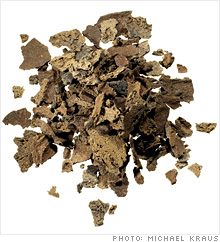From beer sludge to fish flakes
Biologist Andrew Logan turns waste from breweries into food for farmed seafood.
 |
| Oberon uses bacteria to turn unwanted beer sludge into premium protein feed for fish farms. |
(Fortune Small Business) -- Andrew Logan has what every manufacturer craves: an endless source of free raw materials that his suppliers can't wait to dump and a market starving for his product.
Logan, a biologist in Idaho Springs, Colo., turns waste from breweries into a fish-food ingredient. His company, Oberon FMR, spent a decade refining a proprietary mixture of microbes trained to eat food-based wastewater. When dried, the bacteria become high-protein flakes for the booming $100 billion aquaculture industry.
"The opportunity is massive," says Logan, 38.
His suppliers agree. By law, breweries and foodmakers must find safe removal solutions for wastewater; hauling it away and composting it (or, in winter, storing it) can cost up to $3 million a year. Now Oberon takes it off companies' hands for free. With 65 million tons of seafood farmed for human consumption annually, fish farms are growing by an average of 9% a year and need a new kind of premium feed.
Logan learned about that in 1998 while studying salmon in Norway for his doctorate. Herring, anchovies and whitefish -- used in fish meal -- were getting scarce. Farmers wanted a high-quality protein to raise larger and tastier fish.
"We can't hunt down any more small fish," says David Tze, managing director of Aquacopia Capital Management, a U.S. venture firm that focuses on aquaculture. "The search for fish-meal replacements is increasing."
Logan and classmate Seth Terry read a book that suggested creating protein from modified bacteria, and Oberon was born. The pair tried feeding their product to tilapia, then took it to the salmon in Norway. A 16-month pilot project at Colorado's New Belgium brewery (makers of Fat Tire ale) followed. Oberon has since inked a deal with MillerCoors to turn 5,000 tons of sludge into 6,000 tons of food flakes.
Oberon isn't alone in the quest to find a new protein source for the world's fish. Companies in China and Norway are looking at corn, wheat, even feathers from chicken processing. But Oberon, which plans to launch its flakes in 2010, will be the first to have a free and plentiful food source.
"It's a breakthrough," says Ronald Schuyler, who designs wastewater-treatment plants at Tetra Tech, an environmental consulting firm in Pasadena. Logan aims to open a new $6 million operation every nine months; each would pump out up to 15,000 tons of flakes a year, which could feed 200,000 tons of fish. ![]()
-
The Cheesecake Factory created smaller portions to survive the downturn. Play
-
A breeder of award-winning marijuana seeds is following the money and heading to the U.S. More
-
Most small businesses die within five years, but Amish businesses have a survival rate north of 90%. More
-
The 10 most popular franchise brands over the past decade -- and their failure rates. More
-
These firms are the last left in America making iconic products now in their twilight. More









